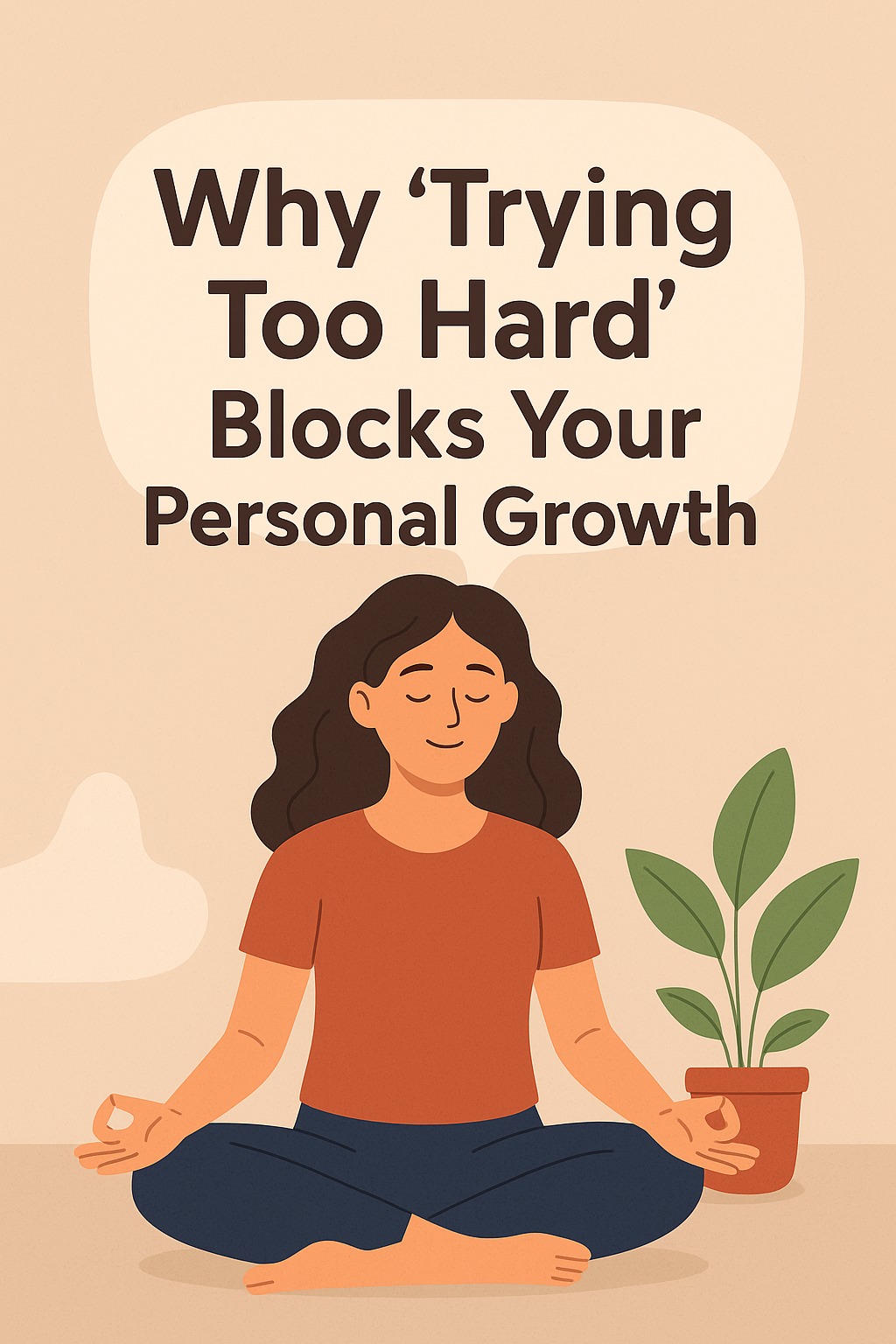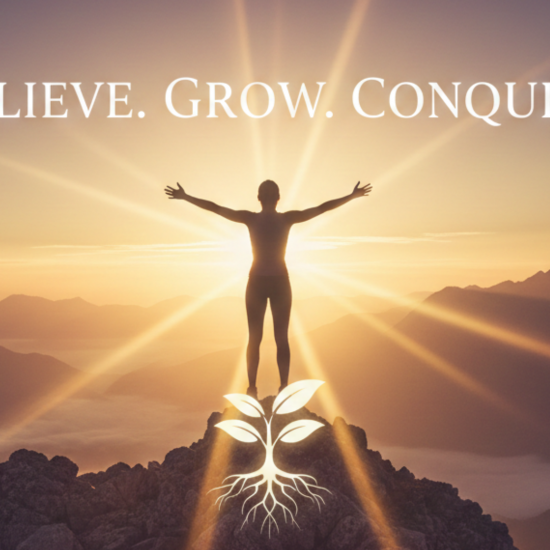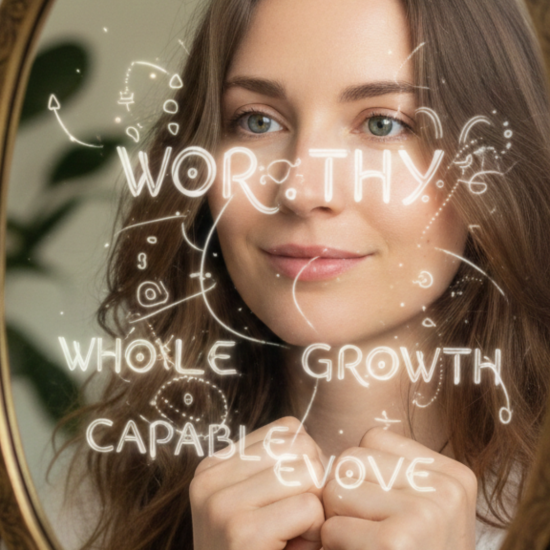Have you ever felt like you’re doing everything right but still not moving forward? You read all the personal growth books, listen to motivational podcasts, and push yourself every single day. Yet somehow, things don’t seem to change. You start wondering if you’re missing something. The truth is, you might just be trying too hard. And sometimes, that effort itself becomes the reason you feel stuck.
We live in a world that celebrates effort. “Work hard,” “never give up,” and “keep grinding” are messages we hear all the time. But when it comes to personal growth, trying too hard can actually slow you down. Growth doesn’t happen through pressure; it happens through awareness, patience, and trust. Let’s explore why over-efforting blocks your progress and how to make personal growth feel lighter, more natural, and more effective.
When Effort Turns Into Pressure
There’s a fine line between effort and pressure. Effort means taking steps toward your goals with purpose and balance. Pressure means pushing yourself because you feel like you’re not enough unless you achieve something. When you start believing that every part of your life needs improvement, personal growth turns into a burden instead of a journey.
You might wake up early, read for an hour, meditate, journal, and still feel unsatisfied. That’s because you’re doing these things from a place of should instead of want. Growth isn’t about how many habits you can stack; it’s about whether those habits are helping you feel more alive, peaceful, and connected. If your personal development routine feels like a job, it’s a sign you need to slow down.
The Hidden Trap of Over-Improvement
It’s easy to fall into the trap of always wanting to fix something about yourself. There’s always another book to read, another mindset to master, another course to complete. While learning is powerful, it becomes a trap when you start believing you’re not good enough until you reach the next level.
Personal development should never make you feel broken. It’s not about changing who you are it’s about uncovering the real you beneath all the noise. If your growth journey feels stressful, you’re probably trying to grow from a place of fear: fear of being left behind, fear of not being successful, fear of not being worthy. Real transformation starts when you grow from love instead of fear.
Why You Can’t Force Awareness
Trying too hard to “become self-aware” is like yelling at a flower to bloom faster. Awareness grows slowly and naturally. When you constantly analyze yourself, asking “Why do I feel this way?” or “Why can’t I change faster?” you create mental tension. Instead of understanding yourself, you end up judging yourself even more.
The best thing you can do is learn to observe without reacting. Notice your emotions without trying to change them right away. Watch your thoughts like clouds passing through the sky. Growth happens when you allow yourself to experience what’s real without labeling it as good or bad. That’s how emotional maturity begins not through effort, but through gentle observation.
Letting Go of the Need to Control
When we try too hard, what we’re really doing is trying to control the outcome. We want to control how fast we heal, how soon we succeed, and how good we become at “being better.” But life doesn’t work on our schedule. The more we try to control everything, the more anxious and disconnected we become.
Think about it this way: when you plant a seed, you water it and give it sunlight. You don’t dig it up every day to check if it’s growing. You trust the process. That’s how personal development works too. You take action, but you also give space for things to unfold. Some of your biggest breakthroughs will come not when you’re working harder, but when you’re allowing life to flow naturally
The Myth of Doing More
Society tells us that success comes from doing more more effort, more hours, more goals. But growth isn’t a competition. More doesn’t always mean better. In fact, overloading yourself with routines and expectations can make you lose the joy of learning and living.
If you meditate for ten minutes with full awareness, it’s more powerful than an hour of distracted effort. If you read one meaningful book and actually apply what you learned, it’s worth more than reading ten books without reflection. The key is not how much you do but how present you are while doing it. Real personal development happens in simplicity, not in overcomplication.
Stop Treating Yourself Like a Project
One of the biggest reasons people struggle with personal growth is because they treat themselves like a project that needs fixing. They believe they’ll only be happy when they become smarter, calmer, or more successful. But you are not a project. You are a person evolving, learning, and expanding in your own way.
When you see yourself as a project, you measure your worth based on progress. You feel proud only when you achieve something and guilty when you don’t. But personal growth isn’t about fixing; it’s about accepting. You’re allowed to rest. You’re allowed to take breaks. You’re allowed to simply be without chasing the next version of yourself. Growth doesn’t disappear when you pause it deepens.
The Power of Surrender
Surrender doesn’t mean giving up. It means trusting the process. It’s letting go of the constant need to control, plan, and perfect everything. It’s saying, “I’ve done my part, now I’ll let life take care of the rest.” This shift is where true transformation happens.
When you relax your grip, you allow space for new possibilities. Ideas start flowing, opportunities appear, and your intuition becomes stronger. You stop operating from fear and start living from alignment. In many ways, surrender is one of the highest forms of personal development because it shows that you trust yourself and the universe to guide your path.
Signs You’re Trying Too Hard
Sometimes we don’t even realize that we’re forcing our growth. Here are a few subtle signs that you might be trying too hard:
- You feel anxious if you skip your routine.
- You constantly compare your progress to others.
- You feel guilty for resting or slowing down.
- You chase quick results instead of enjoying the process.
- You judge yourself for not being “there” yet.
If any of these sound familiar, take a deep breath. You don’t need to push harder — you need to soften your approach. You’re already doing enough.
How to Shift from Pushing to Flowing
If you’ve been stuck in the pattern of over-effort, here are some gentle ways to bring ease back into your growth journey.
1. Focus on awareness, not speed.
Instead of asking, “How fast can I grow?” ask, “What am I learning about myself today?”
2. Replace “I have to” with “I choose to.”
This small shift changes pressure into empowerment.
3. Rest without guilt.
Rest isn’t laziness — it’s how your mind and body integrate change.
4. Keep it simple.
You don’t need ten habits to grow. Start with one or two that truly make you feel good.
5. Practice self-compassion.
Be kind to yourself when you slip up. Growth isn’t linear — it’s full of curves and pauses.
When you make these small adjustments, you’ll notice a lightness in your approach. You’ll start to feel more connected to your goals instead of being weighed down by them.
Redefining What Growth Means
Growth doesn’t always look like progress. Sometimes it looks like rest, reflection, or even falling apart for a while. It’s okay if your journey doesn’t look like anyone else’s. You don’t need to follow a perfect timeline. You don’t need to prove that you’re improving. What matters is that you’re becoming more aware, more grounded, and more yourself.
Remember, personal growth is not about becoming someone new it’s about returning to who you truly are. When you stop trying so hard, you create space to listen to your intuition and reconnect with your natural rhythm.
A Simple Practice for Letting Go
Here’s a small practice you can do whenever you feel stuck or overwhelmed.
Take a few deep breaths and ask yourself:
- What am I forcing right now?
- What if I trusted this process instead of pushing it?
- What would it look like to move with ease instead of pressure?
Write your answers down. You’ll notice how your body relaxes when you shift from control to trust. Do this regularly and you’ll begin to feel more peaceful, even while working toward your goals.
You Don’t Need to Try So Hard
The irony of growth is that the more you force it, the less it happens. But when you slow down, breathe, and allow things to unfold, transformation becomes natural. You start feeling lighter, more confident, and more connected to your true self.
So if you’ve been trying too hard lately, take this as a reminder that you’re already growing. You don’t need to chase change every moment of the day. You just need to stay aware, kind, and open to learning. Growth happens in moments of stillness as much as it does in moments of action.
Personal development is not a race. It’s a lifelong relationship with yourself. And the goal is not to become perfect it’s to become peaceful. The real power lies not in how hard you try, but in how much you trust.
Growth doesn’t need to be dramatic to be real. Sometimes it’s as simple as choosing to respond with kindness, pausing before reacting, or forgiving yourself for being human. When you stop trying to be “better” all the time, you actually begin to live better.
The next time you catch yourself forcing progress, remind yourself that you don’t have to do more — you just have to be more present. The best version of you isn’t somewhere in the future. It’s the you that’s here, learning, breathing, and trying — just a little less hard this time.
Because real personal development is not about chasing perfection. It’s about allowing your true self to shine through, naturally.





